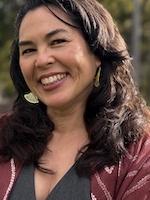Inclusive Digital Citizenship: Merging UDL and Culturally Responsive Teaching
,
Colorado Convention Center, Bluebird Ballroom 3DE
Presenters
Session description
Purpose & objective
Participants will explore what Universal Design for Learning (UDL) is - including best practices in the classroom - but more importantly why UDL should be considered in the teaching of digital citizenship with students who are both neurotypical and neurodiverse.
Participants will learn how to adapt content for the students in their classrooms in ways that are both meaningful and representative of their diverse needs, in addition to identifying how UDL can be used to address the “soft skills” of digital citizenship through culturally responsive teaching practices.
Participants will understand how UDL and culturally responsive teaching intersect and how digital citizenship lessons are based on the culture, relationships, and personal connections of students.
Outline
Essential Questions: Are there challenges to teaching digital citizenship to students who may have extra needs? How can UDL principles and culturally relevant teaching practices help educators teach students who are neurodiverse about digital citizenship?
Introduction: By viewing our lesson design through the framework of Universal Design for Learning (UDL), we can create a welcoming and effective experience for all students, with and without disabilities. We’ll briefly discuss what UDL is and why it should be essential in every classroom. We will discuss the role that culturally responsive teaching plays when teaching students about digital citizenship. (10 minutes)
Model: Presenters will take attendees through a typical digital citizenship lesson from Common Sense Education, modeling additional access points or points throughout the lesson in which UDL concepts and strategies could be incorporated, while considered culturally relevant teaching methodologies. (20 minutes)
Share: Participants will have an opportunity to share out ways in which they have used UDL principles or culturally relevant teaching strategies in their own classrooms or lesson planning. (5 minutes)
Explore: In small groups, participants will be asked to adapt a provided digital citizenship lesson, using learned UDL principles and or culturally relevant teaching strategies. Small groups will then be asked to share out with the larger group. (20 minutes)
Wrap-Up/Questions: Presenters will share out additional resources for planning lessons that are “UDL-friendly” and wrap-up with time for any additional questions or share-outs. (5 minutes)
Supporting research
Dalton, Elizabeth M. “Universal Design for Learning: Guiding Principles to Reduce Barriers to Digital & Media Literacy Competence.” Journal of Media Literacy Education, vol. 9, no. 2, 4 Nov. 2017, pp. 17–29, files.eric.ed.gov/fulltext/EJ1160465.pdf, https://doi.org/10.23860/jmle-2019-09-02-02.
Edyburn, Dave L. “Would You Recognize Universal Design for Learning If You Saw It? Ten Propositions for New Directions for the Second Decade of UDL.” Learning Disability Quarterly, vol. 33, no. 1, Feb. 2010, pp. 33–41, sde.ok.gov/sde/sites/ok.gov.sde/files/Edyburn_Article.pdf, https://doi.org/10.1177/073194871003300103. Accessed 27 Sept. 2023.
Hamayel, H. J., & Hawamdeh, M. M. (2022). Methods Used in Digital Citizenship: A Systematic Literature Review. Journal of Digital Educational Technology, 2(3), ep2207. https://doi.org/10.30935/jdet/12520
“How Does Digital Accessibility and Universal Design for Learning (UDL) Impact Your District’s Technology Planning Process? | National Center on Safe Supportive Learning Environments (NCSSLE).” Safesupportivelearning.ed.gov, safesupportivelearning.ed.gov/voices-field/how-does-digital-accessibility-and-universal-design-learning-udl-impact-your-districts.
“Marrying Universal Design for Learning and Digital Literacy.” Www.literacyworldwide.org, www.literacyworldwide.org/blog/literacy-now/2016/04/22/marrying-universal-design-for-learning-and-digital-literacy. Accessed 28 Sept. 2023.
Session specifications
Tablet: Android, iOS, Windows
Citizen
- Create experiences for learners to make positive, socially responsible contributions and exhibit empathetic behavior online that build relationships and community.
- Establish a learning culture that promotes curiosity and critical examination of online resources and fosters digital literacy and media fluency.
- Use technology to create, adapt and personalize learning experiences that foster independent learning and accommodate learner differences and needs.
 Return
Return Participate and share: Interactive session
Participate and share: Interactive session  Trips and Tours
Trips and Tours

